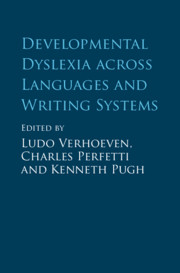Book contents
- Developmental Dyslexia across Languages and Writing Systems
- Developmental Dyslexia across Languages and Writing Systems
- Copyright page
- Contents
- Figures
- Tables
- Contributors
- 1 Introduction
- Part I Developmental Dyslexia across Languages and Writing Systems
- 2 Developmental Dyslexia in English
- 3 Developmental Dyslexia in French
- 4 Developmental Dyslexia in Dutch
- 5 Developmental Dyslexia in Czech and Slovak
- 6 Developmental Dyslexia in Finnish
- 7 Developmental Dyslexia in Russian
- 8 Developmental Dyslexia in Hebrew
- 9 Developmental Dyslexia in Japanese
- 10 Developmental Dyslexia in Chinese
- Part II Cross-Linguistic Perspectives on Developmental Dyslexia
- Epilogue
- Index
- References
2 - Developmental Dyslexia in English
from Part I - Developmental Dyslexia across Languages and Writing Systems
Published online by Cambridge University Press: 27 September 2019
- Developmental Dyslexia across Languages and Writing Systems
- Developmental Dyslexia across Languages and Writing Systems
- Copyright page
- Contents
- Figures
- Tables
- Contributors
- 1 Introduction
- Part I Developmental Dyslexia across Languages and Writing Systems
- 2 Developmental Dyslexia in English
- 3 Developmental Dyslexia in French
- 4 Developmental Dyslexia in Dutch
- 5 Developmental Dyslexia in Czech and Slovak
- 6 Developmental Dyslexia in Finnish
- 7 Developmental Dyslexia in Russian
- 8 Developmental Dyslexia in Hebrew
- 9 Developmental Dyslexia in Japanese
- 10 Developmental Dyslexia in Chinese
- Part II Cross-Linguistic Perspectives on Developmental Dyslexia
- Epilogue
- Index
- References
Summary
It is probably a stretch to say that dyslexia was made for the English language. However, there is a special suitability for a discussion of dyslexia to center on English as the paradigm case. For one thing, the history of reading disability, or dyslexia, is populated by English-language papers from medicine, psychology, and education. Of course, the Germans deserve credit too. Adolf Kussmaul, a German physician, is credited with the earliest (1878) observations on an adult patient with impaired reading (acquired dyslexia), and Rudolf Berlin may have been the first to use the word “dyslexia” in an 1887 book Eine Besondere Art der Wortblindheit (dyslexie) [A Special Type of Word Blindness (Dyslexia)]. The English-language reports of dyslexia began shortly after with the 1896 publication by W. Pringle Morgan, an English physician in the British Journal of Medicine and then the ophthalmologist Hinshelwood (1917), both of whom referred to “word blindness.”
- Type
- Chapter
- Information
- Publisher: Cambridge University PressPrint publication year: 2019
References
- 3
- Cited by

